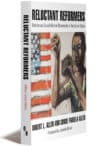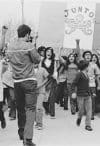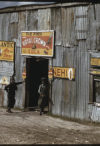
The Reissuing of 'Reluctant Reformers' and Its Contemporary Implications
The reissuing of Reluctant Reformers can inform our attempts to grapple with how the unity of the oppressed can be forged in such a way that the interests of the historically marginalized do not continue to get…well, marginalized. | more…

Bill Fletcher Jr. and Bill Gallegos interview Fernando Gapasin on race, class, and building communities of solidarity. | more…

Racial Capitalism, the Settler State, and the Challenges Facing Organized Labor in the United States
Organized labor—based on white-exclusive and later white-dominated, though not necessarily exclusive, trade unions—formed itself as part of the settler state, not in the sense of being an apparatus of the state, but in the sense of accepting certain important precepts. The unions took for granted the nature of the settler state and, as such, conceived that the unions were to exist to serve the “legitimate” population, or at least the working class of the legitimate population. | more…
Peter Cole, Wobblies on the Waterfront: Interracial Unionism in Progressive-Era Philadelphia (Chicago: University of Illinois Press, 2007), 256 pages, hardcover, $40.00.
Peter Cole has offered an excellent historical examination of a poorly explored moment in labor history. His book, Wobblies on the Waterfront, explores the period (1913–22) when Local 8 of the National Industrial Union of Marine Transport Workers (of the Industrial Workers of the World [IWW]) was the preeminent force on the Philadelphia waterfronts. | more…
David Bacon, The Children of NAFTA: Labor Wars on the U.S./Mexico Border (Berkeley: University of California Press, 2004), 348 pages, cloth $27.50.
I once heard a discussion about the first sentences of books and those sentences that were among the most famous and most powerful. The opening of Gabriel Garcia Marquez’s One Hundred Years of Solitude was among the most popular. David Bacon’s first sentence in chapter one of his book must now rank among the most gripping: “NAFTA repeatedly plunged a knife into José Castillo’s heart.” | more…
The period between September 11, 2001 and the invasion of Iraq raised many questions about the psyche of the U.S. public in general and the U.S. working class in particular. The ability of the Bush Administration to utilize fear and patriotism to refocus attention away from pressing domestic issues has been astounding. The Republican Congressional victories in November 2002 were nearly unprecedented and most likely would not have happened had the focus on Iraq not emerged during the prior summer | more…
Eric Mann, Dispatches from Durban: Firsthand Commentaries on the World Conference Against Racism and Post-September 11 Movement Strategies (Los Angeles: Frontline Press, 2002) 245 pages, $14.95, paper.
It was as if someone pushed a giant delete button. The United Nations World Conference Against Racism (WCAR), held August–September 2001, was one of the most important conferences and social mobilizations to take place in years. Voices from the global South decried the continued presence of racism and xenophobia. Thousands of people assembled in Durban, South Africa with great symbolic importance after the successful anti-apartheid struggle | more…
Miriam Ching Yoon Louie, Sweatshop Warriors: Immigrant Women Workers Take on the Global Economy (Cambridge, Mass.: South End Press, 2001), 306 pages, $18.00 paper.
The reemergence of sweatshops in the United States has taken many people by surprise. It was commonly assumed that sweatshops disappeared years ago and that their presence would no longer be accepted. This proved to be fatally wrong | more…
Jeffrey B. Perry, editor, A Hubert Harrison Reader (Wesleyan University Press, 2001), 505 pages, $70 cloth, $24.95 paper.
Somewhere on the road to becoming a Marxist during the 1970s, I heard about Hubert Harrison. A black radical from the early part of the century, his name was mentioned as an almost mythical character. Little was said about him, except that he was important and had been on the Harlem political stage. And then, almost like a ship disappearing into a fog bank, any further references vanished from view | more…


